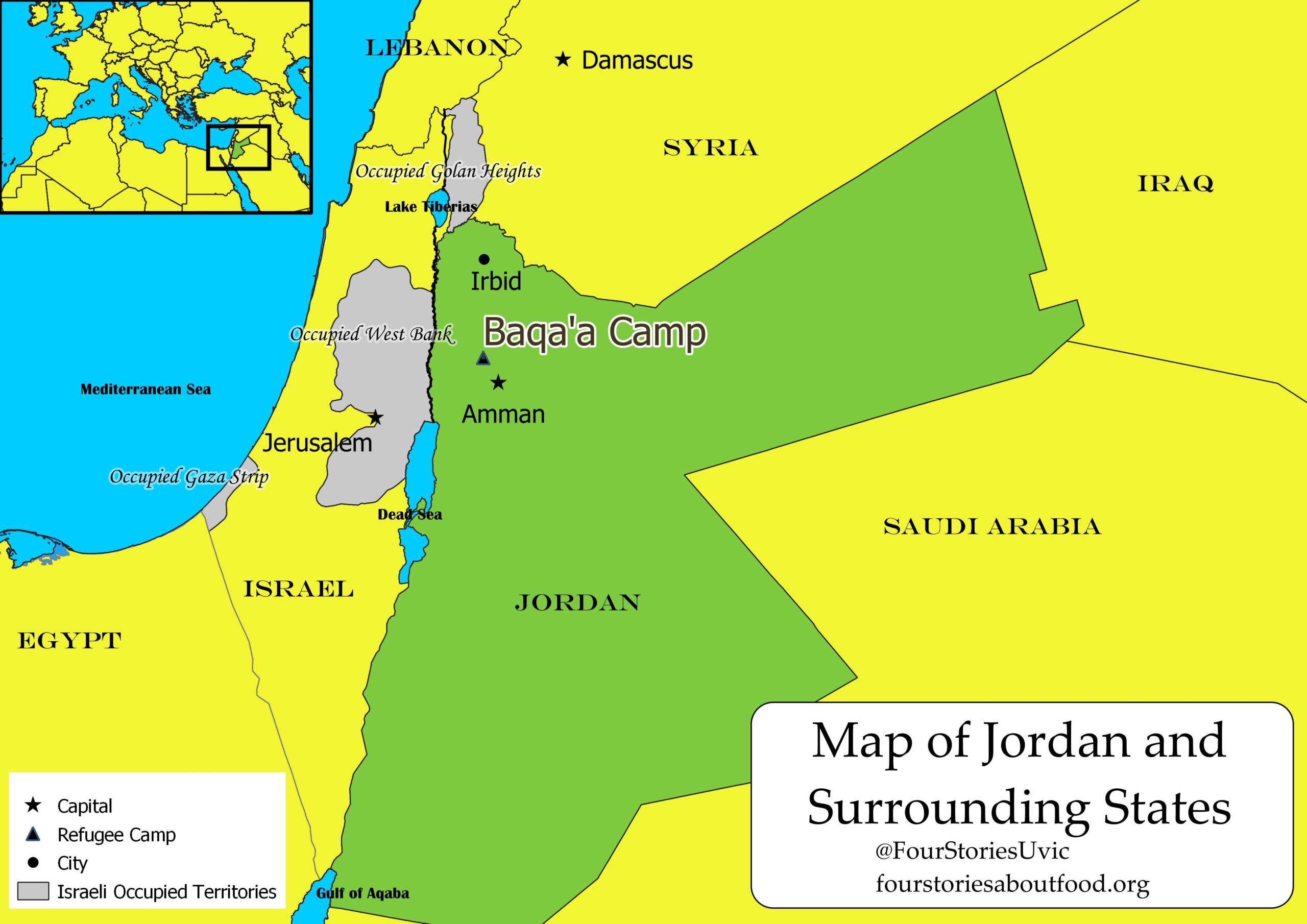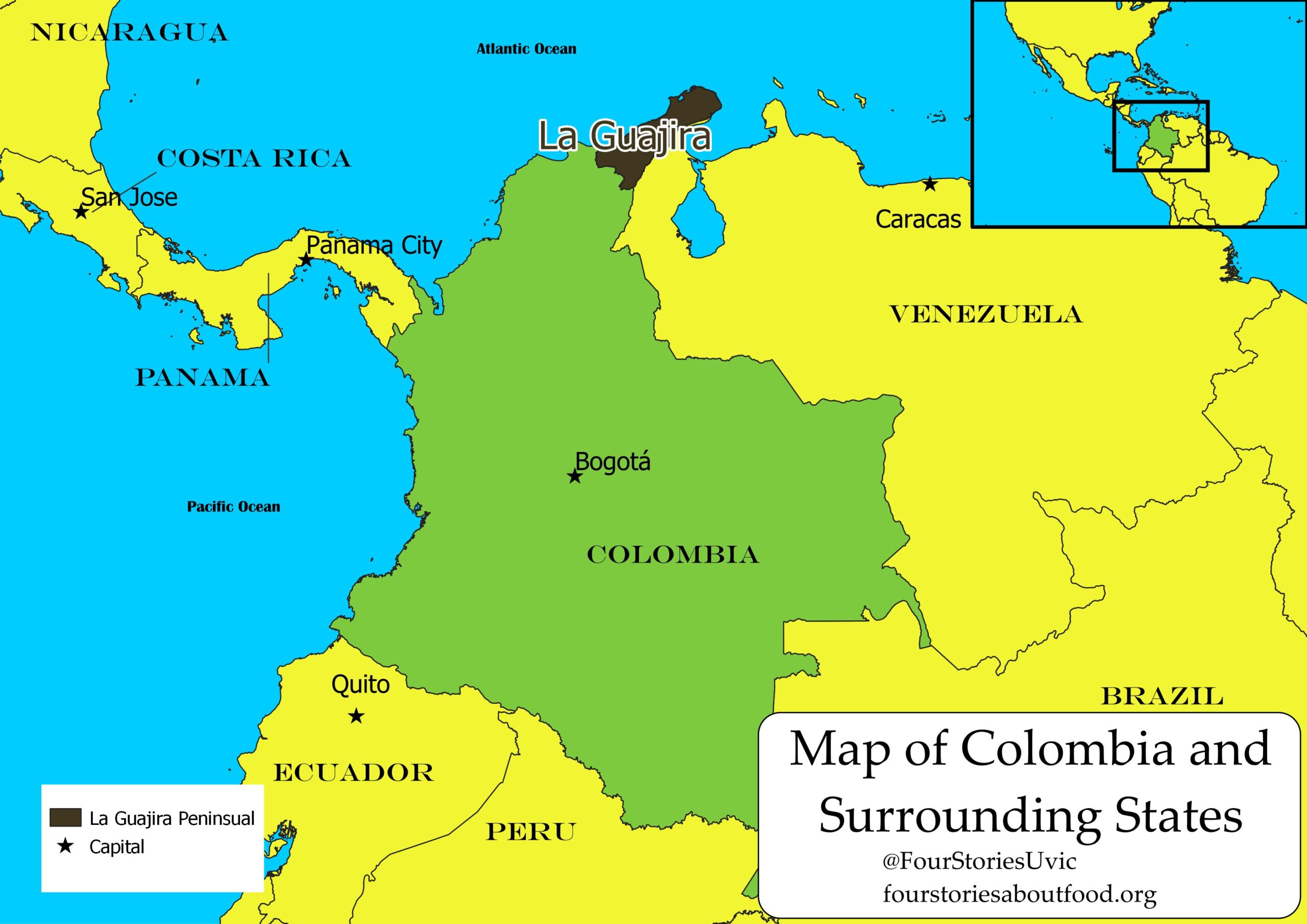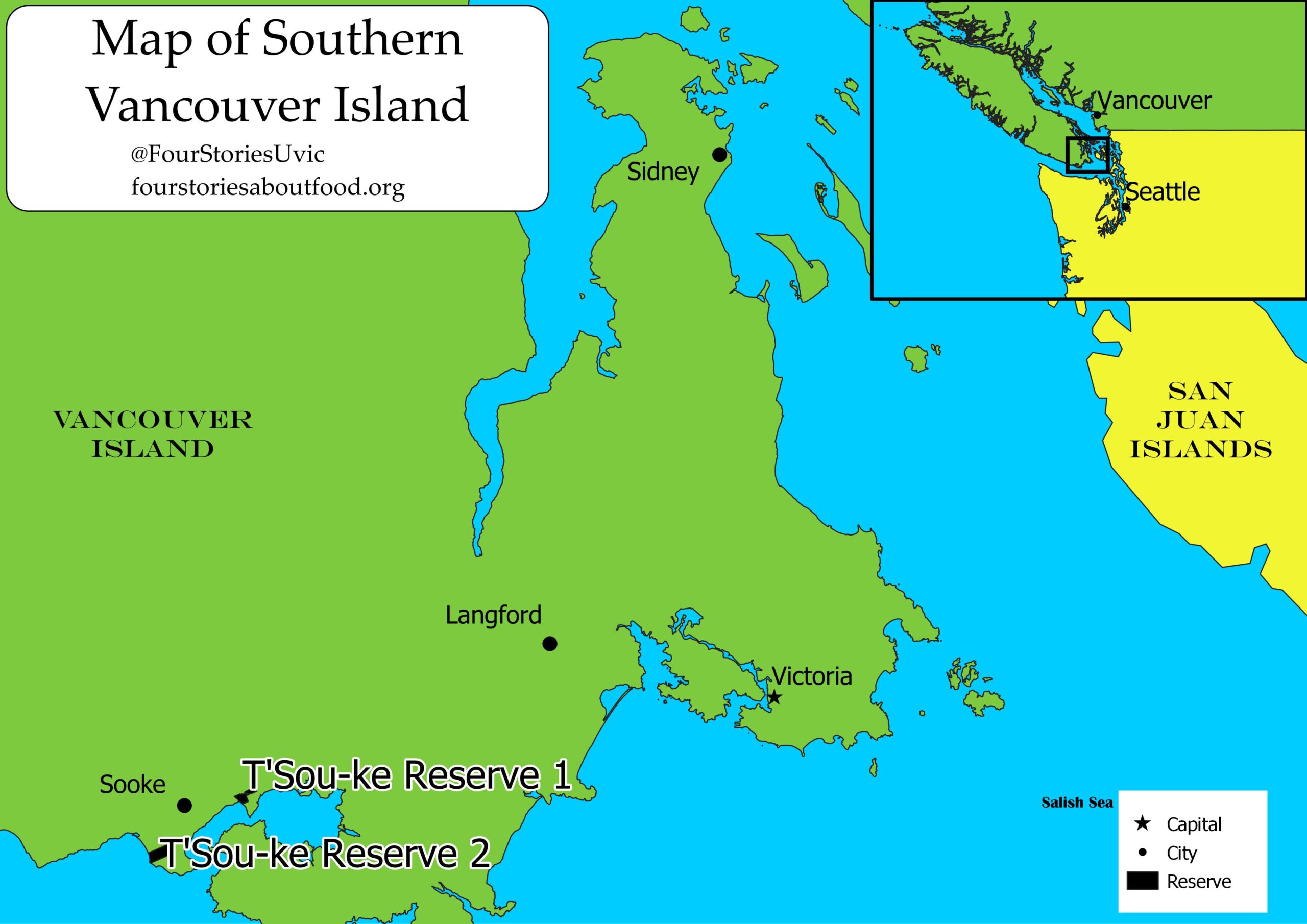Setting maps and summaries
Jordan

Background
Baqa’a is the largest refugee camp in Jordan. It is about 20km north of Amman. According to the UN Relief and Works Agency (UNRWA), the Baqa’a camp was set up as an emergency location in 1968 for people leaving the West Bank and Gaza Strip during the time of the Arab-Israeli war. To read more about the camp visit the UNRWA here.
Living in an urban refugee camp, Palestinian and Syrian refugees face food challenges in this unstable region which is increasingly ravaged by climate change. Residents of the camp are seeking to assert cultural identities by rebuilding fractured food cultures in exile under extreme water and land scarcities, including rising temperatures and shifting seasons.
Meet Aysheh
Aysheh, a resident of Baqa’a, started a grain mill as an income-generating project for her family. The mill is now a community-supporting enterprise that helps to keep Palestinian food culture alive in the Baqa’a camp. The grains used in Aysheh's mill are of a locally-grown, heritage variety wheat adapted to water scarcity and favoured for flavour and texture. They are grown in fields beyond Baqa'a camp, processed in the mill and then distributed out to the bakeries, restaurants, and other small businesses of the camp. Aysheh’s parents had nine boys; she is the only girl who survived. Aysheh herself has 12 children. Aysheh speaks Arabic.
Meet Fatima
Fatima is a retired school principal, a productive market gardener and agricultural experimenter. In 2009 Fatima founded the Kananat Organization to help landless local people learn to use rooftops for at-home food-production. Since the onset of the Syrian crisis in 2011 large numbers of Syrian refugees have benefited from the expertise of Kananat members and its community food projects. Fatima now shares insights into effective Food Security/sovereignty activities to empower the most vulnerable, including recent refugees. The projects range from low-capital, low-tech water harvesting techniques, to rooftop gardening methods, container gardening, covered gardening, and entrepreneurial activities started by poor and refugee women in Irbid, a city in Jordan. Fatima has seven children; she used the Koran to name one of her daughters when she and her husband could not agree on a name. Fatima speaks Arabic.
Meet Imad
Imad is an agricultural engineer at the National Agricultural Research Center in Amman. He has specific interests in environmentally and socially sustainable horticulture and water conservation and has extensive knowledge of traditional water and land stewardship practices. As a fluent English speaker, Imad acts as translator for Aysheh and Fatima.
Indigenous Colombia

Background
The Indigenous Wayuu (pronounced Why-you) community participating in this project is located in northern Colombia in a region called La Guajira. Wayuu pastoralists in Colombia are embroiled in multiple crises as they face severe drought, fight to protect their lands and herds from the massive Cerrejon coal mine on their territories, and confront refugee flows from neighbouring Venezuela.
Meet Jakeline
Jakeline has participated in strategic alliances of communities and Wayuu organizations with the main objective of making visible the situation of violation of the human rights of the Wayuu people in La Guajira. These violations are the result of internal armed conflict (paramilitarism, militarization of the territory, guerrillas), megaprojects in the territory, and forced displacement. Jakeline speaks both Wayuunaiki and Spanish.
Meet Miguel
Like Jakeline, Miguel has taken an active interest in the situation of Wayuu Indigenous women. He has participated in different actions of resistance and defense of the territory, the main challenge being to gain Food Security. He is an Indigenous and community communicator, publicist, documentary filmmaker and photographer. As well, Miguel is the editor of NotiWayuu and director of NotiWayuu printed, coordinator of the Wayuu People’s School of Communications and member of the Putchimaajana Communications Network. Miguel speaks both Wayuunaiki and Spanish.
Fuerza de Mujeres
Jakeline and Miguel are both members of the umbrella organization, Fuerza de Mujeres (Women’s Strength or Women’s Force). Founded in 2006 by Miguel and others, members seek to protect Indigenous Wayuu human rights in La Guajira, with an emphasis on defence of lands and food systems. Miguel is currently the Communications Advisor for this organization.
Indigenous Canada

Background
T’Sou-ke (pronounced SOWK) Nation is a west coast Indigenous community living on T’Sou’ke territory on Vancouver Island. Located just outside of the city of Victoria in the town now known as Sooke, T’Sou-ke Nation Elders and knowledge keepers are key participants in this project. T’Sou-ke Nation is known for its food and energy sovereignty and leads in the area of green technologies, such as solar power.
Meet Chief Gordon Planes
Chief Planes (pronounced PLAN-iss), an elected chief and hereditary leader of T’Sou-ke Nation, has extensive knowledge of the ecology, geography and traditional practices of southern Vancouver Island. He has strong interests in T'Sou-ke arts and culture, Indigenous land rights and governance, traditional ecological knowledge, and alternative energy systems. Regularly taking T'Sou-ke dancers abroad to share their art with international audiences, Chief Planes is himself a traditional singer and visual artist. He is also an active leader in the annual international Tribal Canoe Journey along the British Columbia and Washington coasts.
Meet Christine George
Christine George is a specialist in Indigenous plants used for medicines and foods. In addition to her work teaching school groups about Indigenous plant and land use, she is the founder and lead farmer at the T’Sou-ke Nation's community food garden. She shares her deep knowledge of the cultural uses of plants and which practices have been lost, or reduced, due to land loss.
South Africa

Background
Four Stories About Food Sovereignty works with three generations of female farmers in rural Nwamitwa, South Africa, about 450km north of the city of Johannesburg. These women, most older than 60, struggle to create community and dignified livelihoods amid structural unemployment and the effects of climate change. Members of the Hleketani Community Garden (featured in the award-winning film The Thinking Garden), these women have been succeeding at providing the local community with nutritious, affordable, accessible vegetables for more than 25 years in the face of enormous challenges, from the HIV/AIDS pandemic to devastating droughts.
Meet Josephine
Josephine is a founding farmer and board member at Hleketani Community Garden. She has a wealth of experience as a small-scale farmer in a resource-poor, former apartheid 'homeland'. With fellow community members she has weathered political upheaval, the crushing HIV/AIDS epidemic, damaging shifts of the global economy, drought and other deepening effects of climate change. Josephine speaks from personal experience about these pressures, including efforts to build a community of farmers within the farm gates, repeated thefts, and difficulty attracting younger farmers. Her name means “hatred” which comes from her grandfather’s brother who was hated by the family. Josephine speaks xiTsonga.
Meet Mphephu
Mphephu is a founding farmer and board member at Hleketani Community Garden. She is a true leader and key team member at the farm and in the community: Mphephu is always one of the first at the farm in the morning, frequently there just after daybreak, and one of the last to head home as the sun dips low at the end of the day. She often leads colleagues in rousing praise songs, and is a strong representative of the farm to government agencies; she once camped out at the electricity utility's office when staff ignored the farm's needs. Mphephu’s name means “suffering”, something that was experienced by her parents who tried to have children for 20 years and then “God gave them [me]”. Mphephu speaks xiTsonga.
Meet Basani
Basani is a student of Media and Communications at Boston College in Pretoria, South Africa. She has a deep interest in sustainable community development and is an advocate for Hleketani Community Garden and small-scale farmers more generally. She served as assistant director of the documentary film The Thinking Garden and is specializing in film for development in her studies. Basani serves as interpreter for Josephine and Mphephu who speak Xitsonga, a Bantu language.

